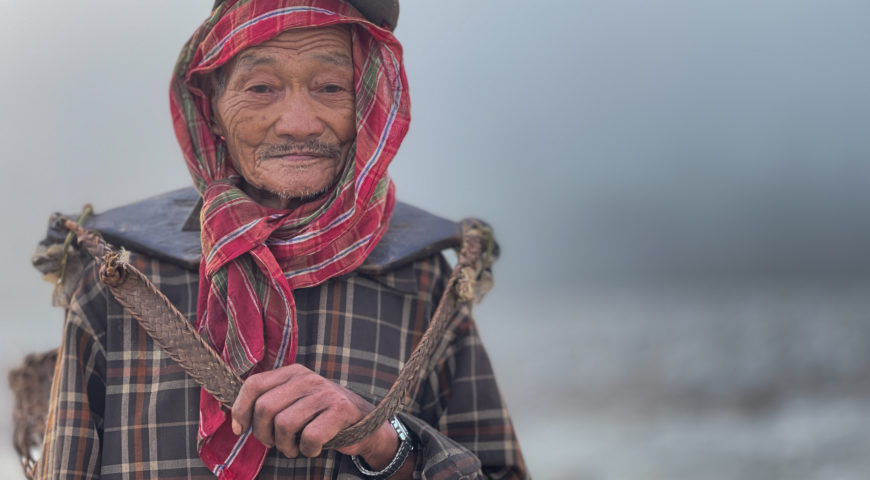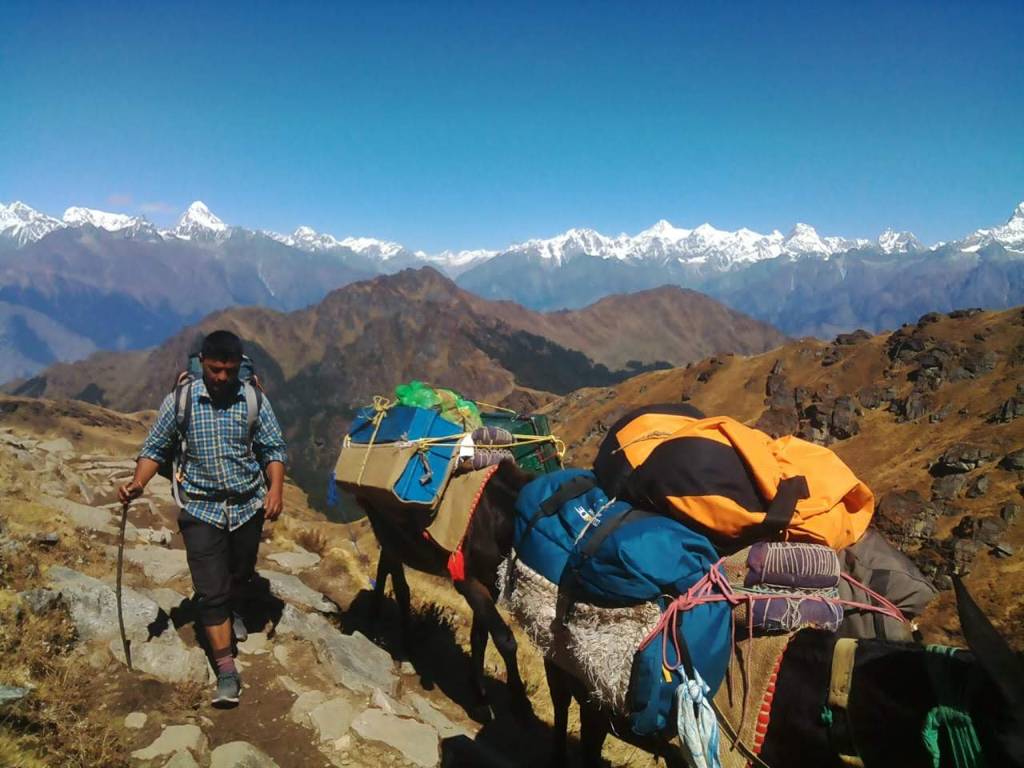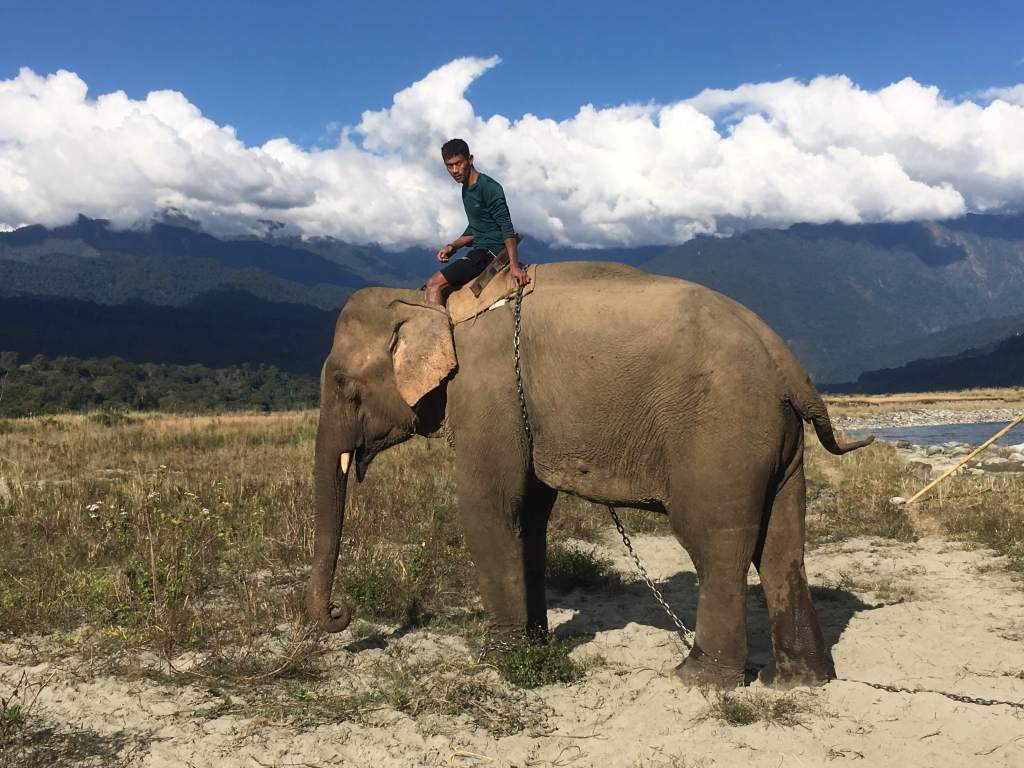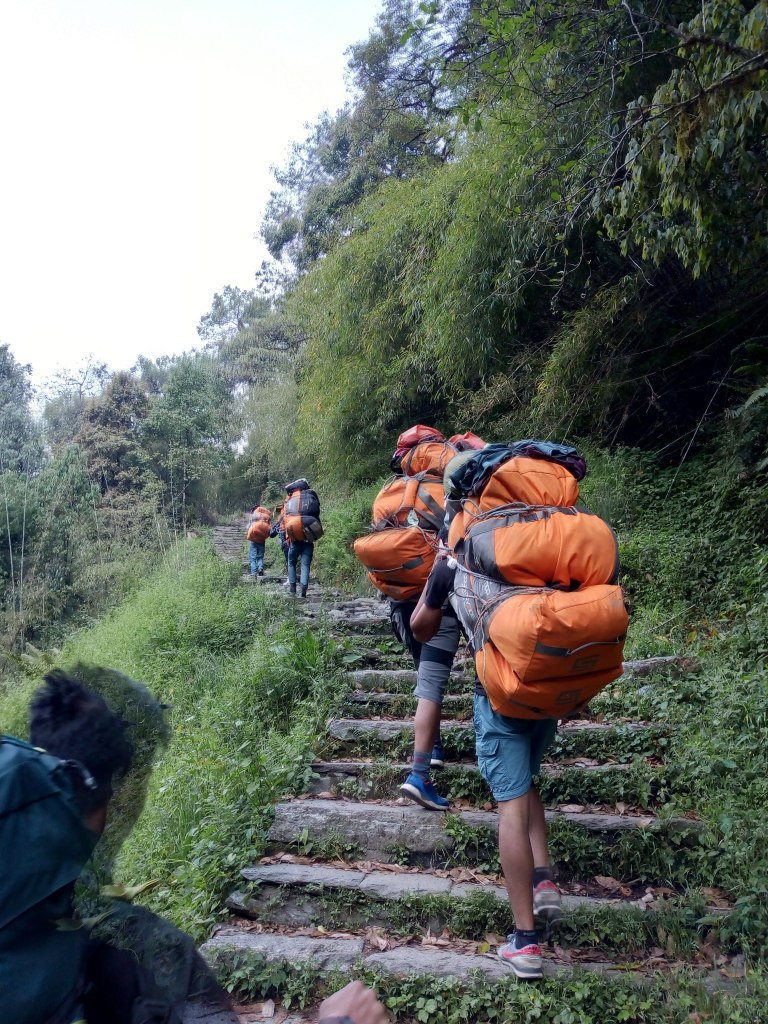
TELE’PORTER
By – Kiran Jadhav (Outdoor Professional)
DON’T TELL ME HOW EDUCATED YOU ARE, TELL ME HOW MUCH YOU HAVE TRAVELED !

It all started with my first trek to the Himalayas with my friends in 2010 just after graduation. We decided to do something adventurous so we choose Shivalik range trails- Sar Pass (4220mtr). It was alpine trekking and we got associated with one of the prestigious trekking clubs in India, we had few supporting staff and mules to carry fuel, groceries and other important stuff. It was my first encounter with these supremely powerful guys they called ‘Porters’!
The guy in blue shirt, jeans and a sweater tied around his waist with smile on his face. He was in his early twenties then, I thought he must be a local guy from our base camp but on very next day I saw him with his 2 mules saddling up the essentials stuff of the trekking gears. I was curious to know, how he would be help for such a tough trek. But on that 6 days trek I got the answer- the way he walked with the mules in the mountainous terrain, with thick foliage in parts and almost always under uncongenial weather, recorded heights varying 1800 metre to 4200 metres. While walking through jungle I had a casual talk with this guy to know his personal and family life. His family mainly depend on farming but to help with his share in the household he had started going on such treks with the mules. While he simultaneously did his schooling in the nearby village, with high ambitious to start his own small trekking company and homestay business in his village to give a better lifestyle to his family,looking at his selflessness I was overwhelmed.
It has been a long road … From a mountain coolie, a bearer of loads, to a wearer of a coat with rows of medals who is carried about in planes and worries about income tax.
Tensing Norgay.

Not everyone can be a Tensing Norgay, but that doesn’t stop other Sherpas/porters from the hardships. Nepal being very close to my heart- reason is self-explanatory and the respect for Sherpa community is as good as like a family member. It was the month of November, and as usual I was out in the Himalayas, this time on a new trek in Annapurna region- Mardi Himal, pretty new route opened commercially and within a week you can finished the trek. I met my Sherpa and porter team at the base. Age group varied from 17- 50 years,but one thing that was common in all was their smiling faces and polite nature. If you been on any treks in Nepal you will notice that these guys are very obsessed with music (local). Throughout the trek every night we used to sit outside our tea house an enjoy a small cultural program. I remember it was Diwali time and these guys left their homes to earn money so that they can go back home with gifts. In Nepal Bhai-Duj is very auspicious as declared by the royal astrologer. Which is why it is religiously followed by the entire masses including the king himself. It is customary for the sisters to provide a sumptuous meal along with fruits, sweets, and gifts as shagun to their brothers. The brothers return the favor with cash and gifts for their sisters. It was our last day of the trek, and I observed that these guys were quite in a hurry to take us down at the base so that they could attend the rituals back home. I asked one of the Sherpa, why they were all in such a hurry? He politely apologized first, and then told me that from the base there is only one bus that leads to the city, if they miss it then would have to walk for 17 km to the main road. I astonished by their dedication and attachment towards their family. We somehow reached the base, but sadly it being a national holiday, the bus services had been cancelled. I can’t express to you how I felt that day. I apologized to them, because we were the reason, they couldn’t attend the rituals. My Sherpa, Prem Dai said – ‘ Khali haath jaane se toh accha hai, kuch kama kar, thodi der se jaaye’ (it’s better to go late with the gifts rather than empty handed). It was a heart touching moment. We decided to give them a ride in our jeeps which came to pick us up. It took me half and hour to convince those guys to sit beside me in the car. Yes, it was one of a joyrides with these extremely kind hearted guys, we were singing, promising each other will meet soon and taking selfies. A lesson I learnt with this experience was – You have to go through some bad days to earn the best days of your life.
Sometime worst trek experience (nightmare) becomes your favorite place filled with the best of the friends, memories to last a life time and hidden surprises. – Anonymous.


- In Nepal, maximum treks driven by Sherpa community.
- In Uttarakhand and Himachal Pradesh we have an options of porters or Pony (Mules).
- In North east Elephants has been used to carry essentials.
After walking across Himalayas as well as western Ghats regions I can say that, these porter/ Sherpa/ horseman community run on their ethics and discipline. You will not have a bitter experience when they are around. I always felt safe and secure. Hiring a personal local porter or pony will definitely help the local economy. In this Alpine trekking/solo trekking era I would recommend at least use local tea houses instead of tents. eat local food and travel in local transport. It’s ‘we’ the traveller/tourist who can change their life in a better way.


Helping a person will not necessarily change the world, but it will change the world for that person
Along with the porters and Sherpa there are more pillars of every outdoor experience those are; Kitchen and camping team. It’s because of them we get a timely & hygienic food on the treks. Without the camping team, its nearly impossible to survive in the rains, wind, snow fall and hailstorms, these determine people do not give a damn about the harsh conditions and makes us comfortable in our tents. I remember my last trek to Bara Bhangal- we were supposed to cross one of the toughest passes- Thamsar (4700mtr), as decided we got our packed lunch from our kitchen team and we started somewhere around 0730 hrs, speculation was to reach pass in 4 hours considering good weather conditions. Unfortunately, the weather god was not in our favour and it took us 07 hours to cross as there was continuous hailstorms on descend. By the time we reached it was dark, we all were drenched in the storm and exhausted as we walked for almost 12 hours or so in thoes harsh conditions. However, what I saw when we reached the campsite was, our kitchen team was ready with hot soup and croissants and had already started preparing dal-Khichadi for all of us. They had also kept our sleeping bags near fireplace as it was totally drenched, they even forced us to eat something when we denied to eat anything, since inside the tents got very cold due to condensation. Our kitchen guy was clearing the same in the night so that we wouldn’t feel cold. We managed to survive that night, this shows how alert and vigilant they are. Next morning our limbs started crying in the pain of previous day’s fatigue, but these guys were all prep up with a smile; served us ginger lemon tea and good sumptuous breakfast.
The strengths and values that these incidents highlight is not from people blessed or born with them, but those who have acquired it through hard work and determination. When I experienced these episodes the one line that reverberated in me was ‘I too can!’ I certainly feel more fulfilled human being because of the chance I got interact and spent some time with these marvelous guys. I hope this magic works for you as well.


